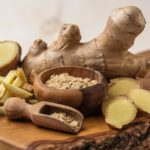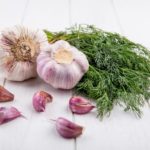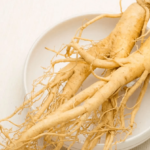
Cary McKechnie
(BNat Med, NHMNZ)
Note — The article was checked and updated August 2024.
Rosemary is best known to many as a great addition in the kitchen and an amazing herb to add to almost any dish. But research today reveals that rosemary also has herbal and health properties such as being an
- Antioxidant
- Antibacterial
- Carminative
- Antispasmodic
- Anti-inflammatory
Rosemary has also shown significant benefits for memory and speed of memory recall.
If you are truly interested in your health and would like to understand the benefits of rosemary, and how to best include it into your nutrition or supplementation, we suggest having a read.
Introduction
Rosemary is a powerful antioxidant and antibacterial herb that is also commonly thought of to improve memory.[1,2]
History shows that rosemary was used to strengthen memory with students wearing sprigs in their hair while they studied.[3]
Other names
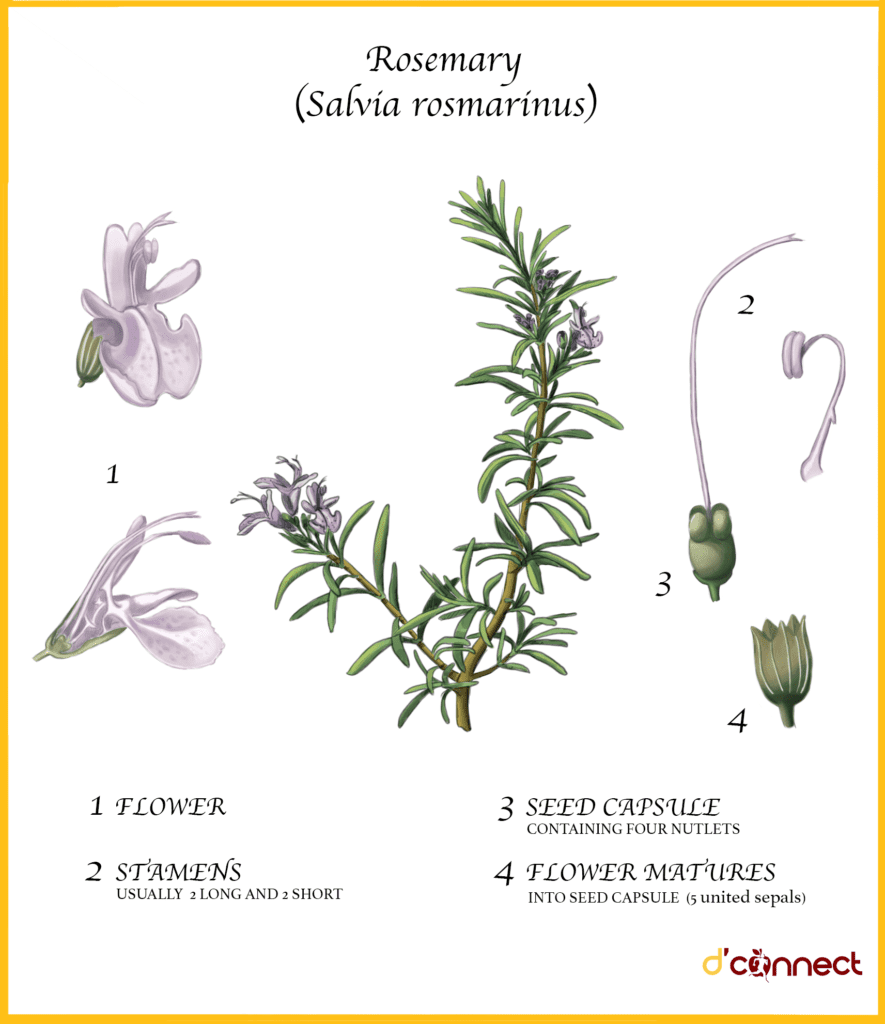
- Rosmarinus officinalis (formerly known as)
- Rosmarini folium (Latin name)
- Garden rosemary.
Characteristics
A member of the mint family, Lamiaceae, this group of herbs has over 7,000 species, including other popular herbs like
- oregano
- thyme
- basil
- lavender
Although rosemary grows across Asia, America and Europe, today it is native to the Mediterranean region.
Rosemary is a perennial plant reaching 60–90 cm and can be identified by its 2–3 cm long narrow dark green and silver leaves. It typically flowers in winter to late spring, with pale blue but sometimes pink or white flowers.
Use
Rosemary has a long history of use in Ancient Greek medicine of the 16th and 17th century, where it was prescribed for the relief of intestinal gas and as a tonic and digestive aid.
Although modern medicine is only beginning to research the therapeutic benefits of rosemary, we are seeing promising potential uses for
- Oxidative stress
- Depression and anxiety
- Memory, learning and Alzheimer’s disease
- Epilepsy
- Addiction
- Antibacterial
- Neuropathic pain
- Stress
- Parkinson’s disease
The majority of research focuses on the constitutions of rosmarinic acid, carnosic acid, carnosol and rosemary’s volatile oils.
Traditional use

Rosemary was traditionally used in food preparation, where it was rubbed on meats to prevent them from spoiling.[3]
It has now been shown by modern medicine that rosemary inhibits growth of bacteria, which can prolong the shelf life of different types of meat.[4]
Rosemary was also used orally for depression, headaches, mental fatigue, stomach ache, rheumatic pains and spasms, and in Ancient Greece, they used rosemary to stimulate the brain and strengthen memory.[1,3]
Medicinal use
Rosemary is a rich source of antioxidants through its bioactive chemicals, which are shown to reduce oxidative stress, boost the immune system and improve blood circulation.[1]
Rosemary enhances superoxide dismutase (SOD) activity
SOD is a powerful constituent in the body’s antioxidant defence system against oxidative stress, and it helps break down harmful oxygen molecules within the cells of the body, preventing damage to tissues.[5]
Low SOD levels in the human body have been linked to cancer, AIDS, cystic fibrosis and red blood cell (RBC)-related disorders.
Health benefits
Rosemary is showing promise for a variety of health conditions, with the main research focusing on
- Depression and anxiety
- Memory and learning
- Addiction
- Natural antimicrobial action
- Cancer inhibition
- Digestion support
- Stimulating hair growth
- Parkinson’s disease
Rosemary is supportive for depression
Research has shown that consuming rosemary tea regularly has antidepressant and anxiolytic effects through the modulation of the BDNF-neurotransmitter axis.[6]
A small pilot study in 2021 showed that drinking 5g of dried rosemary in 100ml of hot water once a day for 10 days alters peripheral anxiety and depression markers.
The 22 healthy volunteers aged between 20 and 50 had significantly increased BDNF and TNF-alpha levels by 86.92% and 42.42%, respectively, by drinking rosemary tea.[6]
There were also slight increases in the anti-inflammatory cytokine IL-4 and a decrease (although not statistically significant) in cortisol and IL-6, showing rosemary as a potential antidepressant.[6]
RELATED — Depression Signs and Symptoms: Stop the downward spiral in time (Part 1)
Rosemary, learning and memory recall
Rosemary is considered a cognitive stimulant and can help us feel more awake and focused.
Another research (double-blind control study of 68 university students, male and female) showed that taking 500 mg of rosemary twice daily for one month had
- improved memory
- reduced anxiety and depression while also improving sleep quality in university students.[7]
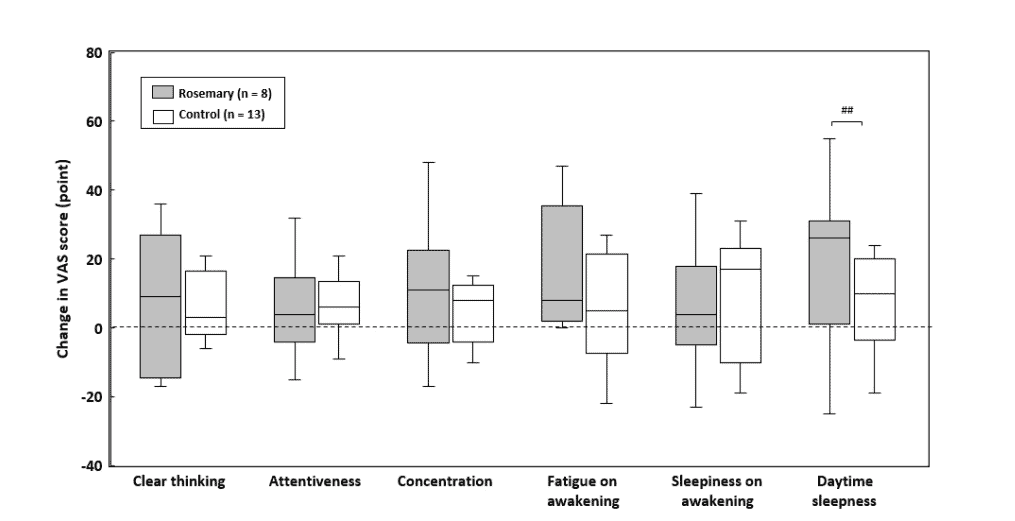
Source: Araki, R. Effects of Continuous Intake of Rosemary Extracts on Mental Health in Working Generation Healthy Japanese Men: Post-Hoc Testing of a Randomized Controlled Trial. (2020)
Compounds found in rosemary have neuroprotective effects protecting the brain against free radical damage. Other compounds promote blood flow to the brain tissue, stimulating the mind.
Low doses of rosemary enhance cognition in the elderly population
Rosemary can assist with addiction
Opioid use is a global epidemic, which has caused a number of people to become addicted and experience severe withdrawal symptoms when opioids are no longer needed.
Rosemary may have the potential to reduce symptoms related to opioid withdrawal syndrome.[8]
A study looking at opioid withdrawal used 8–16 capsules containing 300 mg of dried rosemary showed a reduction in insomnia, musculoskeletal pain and improved sleep over 4 weeks.[8]
Rosemary as a natural antimicrobial
Rosemary extract is shown to have antibacterial properties in vitro against specific harmful bacteria such as H. pylori and Staphylococcus aureus.[1]
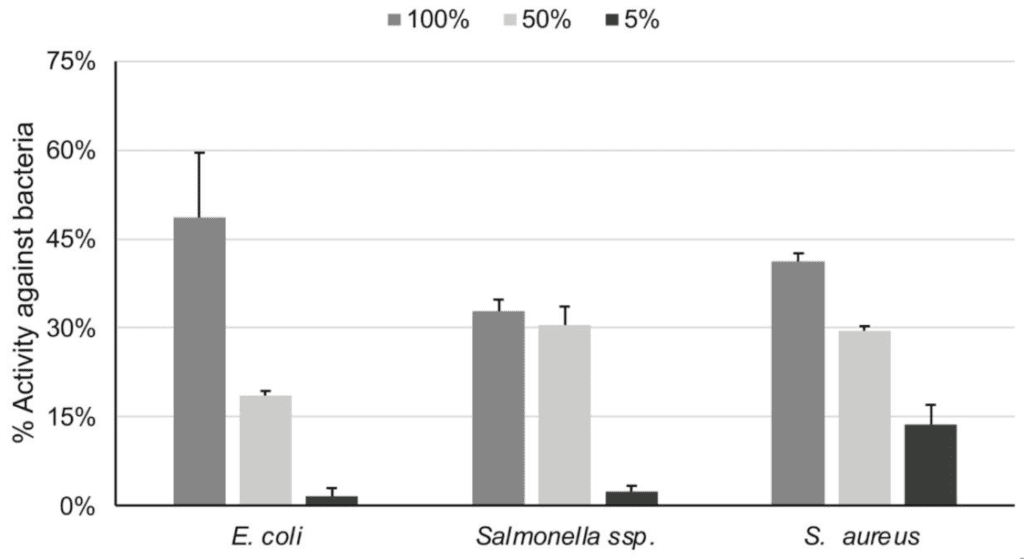
Source: Lamari, F. Rosemary Extract and Essential Oil as Drink Ingredients: An Evaluation of Their Chemical Composition, Genotoxicity, Antimicrobial, Antiviral, and Antioxidant Properties. (2021)
Rosemary as a cancer inhibitor
Rosemary extract and essential oil is shown to protect DNA from oxidative damage, which may reduce cancer development.
Increasing scientific data is indicating rosemary extracts may have potential to be both preventative and an adjunctive agent in the treatment of a number of cancers such as breast cancers, cervical cancer and colorectal cancers.[9]
RELATED — How common is Breast Cancer and what are the Risk Factors?
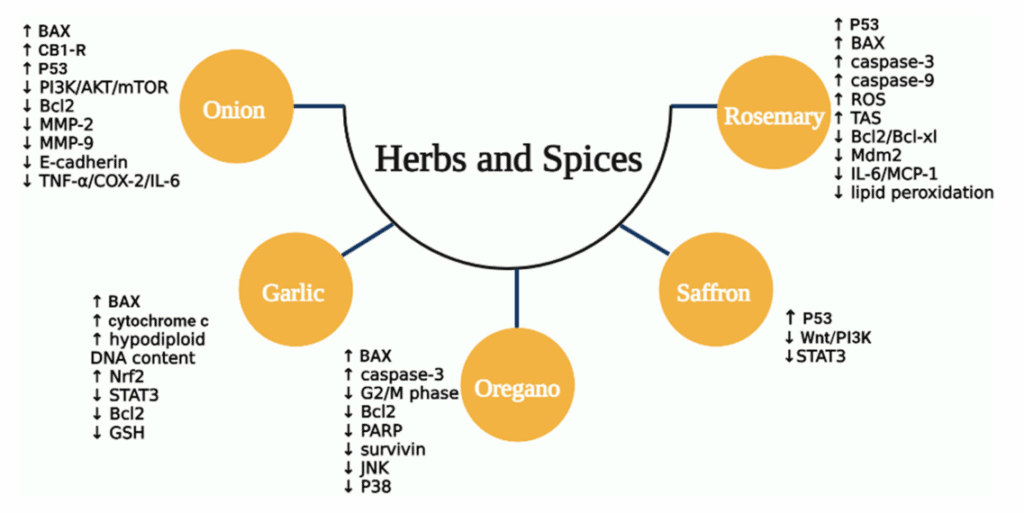
Source: Mahmod, A. Chemoprevention effect of the Mediterranean diet on colorectal cancer: Current studies and future prospects. Frontiers in Nutrition. (2022)
A small in vitro study examined rosemary along with other herbs like
- Bay leaf
- Turmeric (Curcuma longa)
- Ginger
- Sage
and their inhibitory effects on the growth of colorectal cancer cell lines. The study concluded that using these herbs individually or as a combination significantly inhibited colorectal cancer cell growths via apoptosis.[10]
RELATED — Anti-cancer foods: The Healthiest Herbs and Spices (Part 1)
Rosemary also has the ability to reduce cancer risk from eating high-heat and charred meats given that high-heat cooking is shown to create carcinogenic compounds which can alter DNA leading to cancer.
Rosemary and digestion support
The German Commission E, which looks at the safety and efficacy of herbs, has approved the use of rosemary leaf for indigestion.
Traditionally, rosemary was used for digestive issues like loss of appetite, gas, bloating and abdominal pains. The carminative actions of rosemary are shown to relieve the symptoms of indigestion, particularly with excessive gas.
Rosemary protects against DNA damage
A study using a combination of 250mg of rosemary and citrus bioflavonoid extracts taken orally were shown to inhibit the harmful effects of UV light on human keratinocytes.[11]
The study indicated more synergistic effects in the combination of rosemary and citrus bioflavonoids than when rosemary was used individually. UVB-induced ROS were also decreased when using the combination of extracts.
Rosemary and citrus bioflavonoids taken together can reduce UV skin damage
The study showed that there was an increase after 8 weeks but strong protection was achieved after 12 weeks. Taking rosemary and citrus bioflavonoids orally for 8–12+ weeks is shown to reduce UV damage to the skin.[11]
Rosemary as stimulant for hair growth
Traditionally, rosemary was used to stimulate hair growth, and studies are now indicating its potential to support this.

Source: Jamieson M, Successful Treatment for Alopecia Areata. Arch Dermatol. (1998)
A study looked at 84 people who had alopecia areata. The participants massaged their scalps with rosemary and other essential oils (lavender, thyme, cedarwood) every day for 7 months, which showed hair regrowth in those using the essential oil combination compared to those in the placebo group.[12]
Rosemary and Parkinson’s disease
Rosemary is shown to be supportive in Parkinson’s disease through the two constitutions – carnosol acid and carnosol.
Carnosol acid has been shown to be neuroprotective, inducing antioxidant enzymes and inhibiting cell apoptosis, while carnosol increases the amount of tyrosine hydroxylase enzyme, which is down regulated in Parkinson’s disease.[13]
Therapeutic dosage
Rosemary can be used as:
- Dried whole herb
- Dried powdered extracts in capsules
- Fresh and dried leaves made into tinctures, teas and liquid extracts
- Essential oil (external use).
According to the German Commission E., the safe internal daily dosage of rosemary is
- Dried herb: 4-6 g
- Essential oil: 2 drops
- Liquid extract: 2–4 ml (1:2 ratio).[14]
Doses, however, should always be adjusted to height, weight, age and constitution, and this is why it is always best to seek a herbal prescription from a trained professional.
Safety concerns
Rosemary is generally recognised as safe (GRAS) in the US when consumed in reasonable amounts. However, taken in large amounts, it may cause side effects such as stomach and intestinal irritation and seizures.[1]
Adverse reactions
Rosemary is best avoided or used with caution if there are known allergies to other herbs in the mint family.[1]
Rosemary can inhibit the uptake of iron from non-heme foods by around 15–20%, and those with anemia should be mindful of consuming rosemary with non-heme iron foods.[1]
Rosemary may inhibit uptake of iron
Rosemary is considered safe to eat during pregnancy. However, therapeutic amounts may have stimulant effects on the uterine and menstrual flow, so therapeutic amounts should be avoided during pregnancy.[15]
Possible interactions with medications
Therapeutic doses of rosemary may interfere with some medications.
Rosemary is shown to inhibit platelet aggregation (the blood’s ability to clot) in vitro and may theoretically increase the risk of bleeding if used with anticoagulant or antiplatelet drugs including warfarin and aspirin.[16]
Rosemary may act as a diuretic, increasing the risk of dehydration when used with diuretic drugs.
Rosemary may interfere with the action of ACE inhibitors used for high blood pressure due to its potential diuretic effect.[16]
Possible interactions with herbs and supplements
Rosemary is considered safe to ingest, and there are no safety concerns I can see with taking rosemary with other herbs.
Tips
To remove rosemary leaves from the stem, hold the tip of the stem with one hand and place your index finger and thumb of your other hand just below where you are holding the stem. Hold firmly with your index finger and thumb and run them down the stem to strip the leaves from the stem.
Fresh rosemary can be stored in the refrigerator for up to three weeks or several months in the freezer. If using dried rosemary, place it in an airtight container and store in a dark place.
Summary
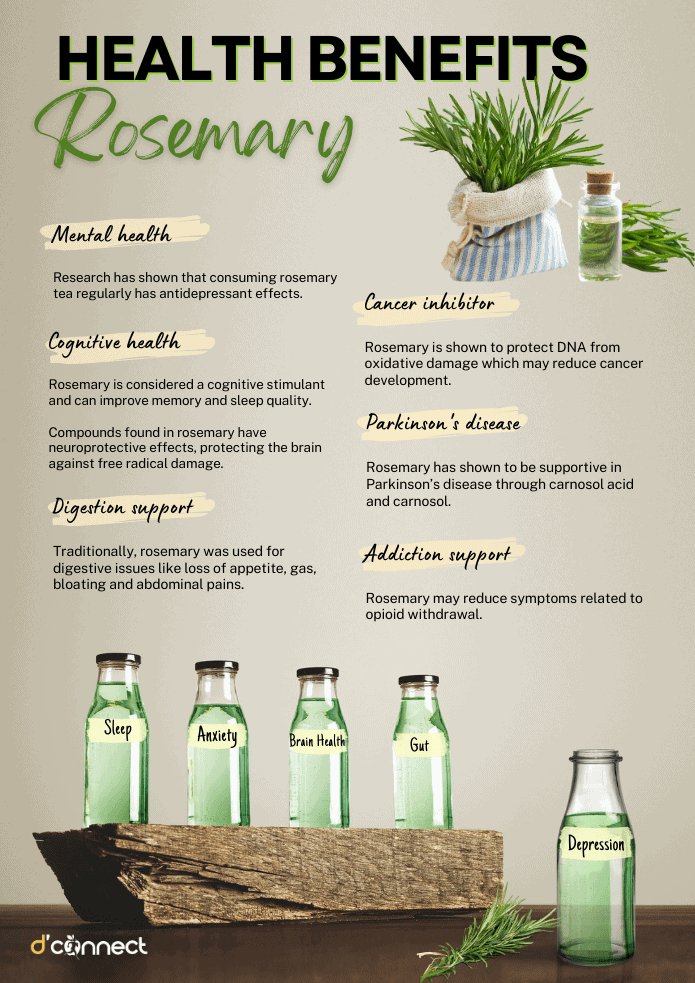
Note — feel free to share or download this illustration.
Related Questions
1. How often can I drink rosemary tea?
One to two cups a day is considered safe for most but if you are taking any medication, such as the ones listed in the previous section, then use caution or check with your primary health care provider.
2. What is better and healthier to use – dry or fresh rosemary?
Generally, fresh rosemary is best for cooking, aromatic teas or infused water. Dried rosemary is best for teas or if making herb-infused oils or vinegars.
3. Can I use rosemary powder on my hair?
Rosemary powder can be used as a hair mask by mixing with warm water into a paste-like consistency. Once mixed, apply to your hair, leave it on for several hours, then rinse.
Important note – If taking pharmaceutical drugs, always check with your primary health care provider before taking any therapeutic doses of herbal preparations.
Rosemary is a fantastic addition to any meal, and the smell is simply amazing. If you are looking for different ideas on how to include rosemary in your next weekend family lunch, we suggest checking our Recipes.
Also, if you are interested in other herbs and how they can possibly enhance your health, then see our Natural Medicine section.
Cary is a registered naturopath and medical herbalist at the Natural Health Clinic. Her mission is to educate, share and motivate people to optimize their own health. Using functional medicine and evidence-based nutritional, dietary, herbal and lifestyle approaches, Cary supports her clients, and assists with a range of health issues from acne, gut problems and hormone health to autoimmune support and general wellness.
References
(1) Braun, L., & Cohen, M. (2015). Herbs and natural supplements: An evidence-based guide (Vol. 2) (4th ed.). Elsevier.
(2) Pengelly, A., Snow, J., Mills, S. Y., Scholey, A., Wesnes, K., Butler L. R. (2012, January). Short-term study on the effects of rosemary on cognitive function in an elderly population. Journal of Medicinal Food,15(1), 10–7. doi: 10.1089/jmf.2011.0005.
(3) De La Foret, R. (2017). Alchemy of herbs: Transform everyday ingredients into foods that remedies that heal. Hay House.
(4) Karpińska-Tymoszczyk M. (2008, November). Effect of the addition of ground rosemary on the quality and shelf-life of turkey meatballs during refrigerated storage. British Poultry Science, 49(6), 742–50. doi: 10.1080/00071660802454665
(5) Younus, H. (2018, May–June). Therapeutic potentials of superoxide dismutase. International Journal of Health Sciences (Qassim), 12(3), 88–93. https://www.ncbi.nlm.nih.gov/pmc/articles/PMC5969776/
(6) Achour, M., Ben Salem, I., Ferdousi, F., Nouira, M., Ben Fredj, M., Mtiraoui, A. … Saguem, S. (2021). Rosemary tea consumption alters peripheral anxiety and depression biomarkers: A pilot study in limited healthy volunteers. Journal of the American College of Nutrition, 1–10. doi:10.1080/07315724.2021.1873871
(7) Nematolahi, P., Mehrabani, M., Karami-Mohajeri, S., Dabaghzadeh, F. (2018, February). Effects of Rosmarinus officinalis L. on memory performance, anxiety, depression, and sleep quality in university students: A randomized clinical trial. Complementary Therapies in Clinical Practice, 30, 24–28. doi: 10.1016/j.ctcp.2017.11.004.
(8) Ghasemzadeh Rahbardar, M., & Hosseinzadeh, H. (2020, September). Therapeutic effects of rosemary (Rosmarinus officinalis L.) and its active constituents on nervous system disorders. Iranian Journal of Basic Medical Sciences, 23(9), 1100–1112. doi: 10.22038/ijbms.2020.45269.10541 https://www.ncbi.nlm.nih.gov/pmc/articles/PMC7491497/
(9) Allegra, A., Tonacci, A., Pioggia, G., Musolino, C., Gangemi, S. (2020, June). Anticancer activity of Rosmarinus officinalis L.: Mechanisms of action and therapeutic potentials. Nutrients, 12(6), 1739. doi: 10.3390/nu12061739https://www.ncbi.nlm.nih.gov/pmc/articles/PMC7352773/
(10) Jaksevicius, A., Carew, M., Mistry, C., Modjtahedi, H., Opara, EI. (2017, September). Inhibitory effects of culinary herbs and spices on the growth of HCA-7 colorectal cancer cells and their COX-2 expression. Nutrients, 9(10), 1051. doi: 10.3390/nu9101051
(11) Pérez-Sánchez, A., Barrajón-Catalán, E., Caturla, N., Castillo, J., Benavente-García, O., Alcaraz, M., & Micol, V. (2014, July 5). Protective effects of citrus and rosemary extracts on UV-induced damage in skin cell model and human volunteers. Journal of Photochemistry Photobiology B., 136, 12–8. doi: 10.1016/j.jphotobiol.2014.04.007
(12) Hay, I. C., Jamieson, M., & Ormerod, A. D. (1998, November). Randomized trial of aromatherapy. Successful treatment for alopecia areata. Archives of Dermatology, 134(11), 1349–52. Doi: 10.1001/archderm.134.11.1349
(13) Wu CR, Tsai CW, Chang SW, Lin CY, Huang LC, Tsai CW. Carnosic acid protects against 6-hydroxydopamine-induced neurotoxicity in in vivo and in vitro model of Parkinson’s disease: involvement of antioxidative enzymes induction. Chem Biol Interact. 2015 Jan 5;225:40-6. doi: 10.1016/j.cbi.2014.11.011. Epub 2014 Nov 22. PMID: 25446857.
(14) Blumenthal, M., Goldberg, A., & Brinckmann, J. (2000). Rosemary leaf. In Herbal Medicine: Expanded Commission E Monographs (pp. 326–329). Integrative Medicine Communications.
(15) American Pregnancy Association. (2021). Herbs and pregnancy. Retrieved September 27, 2022, from https://americanpregnancy.org/healthy-pregnancy/is-it-safe/herbs-and-pregnancy/
(16) Therapeutic Research Centre. (2022). Natural Medicines Database.




